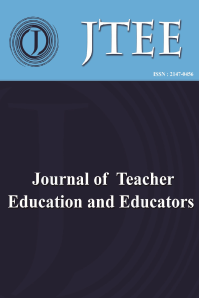Birinci Sınıf Öğretmenlik Bölümü Öğrencilerinin Teoriyi Uygu- lamayla Birleştirmelerine Yardımcı Olan Danışman-Destekli Gözlemler
Finlandiya, Turku Üniversitesi, Rauma kentindeki Öğretmenlik Eğitimi bölümünde, öğretmenlik uygulaması okulunda yapılan destekli gözlemler birinci sınıf öğretmenlik bölümü öğrencilerinin öğretmenlik uygulaması derslerinin önemli bir parçasıdır. Bu çalışma öğretmenlik bölümü öğrencilerinin bir ders süresince kendi öğrenmelerini nasıl düşünüp yansıttıklarına ve uygulamalı çalışmaları nasıl değerlendirdiklerine odaklanmaktadır. Bu çalışma için toplam 73 adet kişisel rapor okunmuş ve gömülü teori yaklaşımını kullanarak bu raporlar analiz edilmiştir. Öğrenciler ikinci yazarın verdiği gelişim ve eğitim psikolojisinin temel teorileri ve kavramlarını öğrendikleri derslere katılmışlar. Bütün öğretmen adayları destekli gözlemleri yalnız başlarına yaptıkları gözlemlere göre çok daha fazla faydalı bulmuşlardır. Adaylara göre, bir dersin bütününü gözlemlemek yerine bir seferde tek bir konuya odaklanmak çok daha kolay bulunmuştur. Buna ek olarak öğretmen adayları dersten sonra yapılan tartışmaların öğretmenlikle ilgili yeni fikirler verdiğini raporlarında belirtmişlerdir
Anahtar Kelimeler:
Öğretmen eğitimi, destekli gözlem, Finlandiya
Birinci Sınıf Öğretmenlik Bölümü Öğrencilerinin Teoriyi Uygulamayla Birleştirmelerine Yardımcı Olan Danışman-Destekli Gözlemler
In the department of Teacher Education in Rauma, University of Turku, Finland, guided observations in the teacher training school are an important part of the firstyear teacher students’ teaching practice period. This study focuses on how the student teachers reflect on their learning, and how they evaluate practical work during a lesson. The student teachers had attended the lectures addressed by the second author where they studied the basic theories and concepts of developmental and educational psychology. Using the grounded theory approach, 73 self-reports were read and analysed. All teacher students reported that they found the guided observations much more fruitful than the observations they did alone. They stated that it was much easier to focus on one aspect at a time than to observe a lesson as a whole. In addition, they wrote that the discussions after the lessons gave them new ideas about teaching
Keywords:
Teacher education, guided observation, Finland,
___
- Chung, H.Q. & Van Es, E.A. (2014.) Pre-service teachers‟ use of tools to systemati- cally analyze teaching and learning. Teachers and Teaching: Theory and Prac- tice, 20(2), 113–135.
- Darling-Hammond, L. (2014). Strengthening clinical preparation: The holy grail of teacher education. Peabody Journal of Education, 89(4), 547–561.
- Darling-Hammond, L. (2006). Powerful Teacher Education: Lessons from Exemplary Programs. San Francisco, CA: Jossey-Bass.
- Eilam, B. & Poyas, Y. (2009) Learning to teach: enhancing pre‐service teachers‟ awareness of the complexity of teaching–learning processes. Teachers and Te- aching: Theory and Practice, 15(1), 87–107.
- Furlong, C. (2013). The teacher I wish to be: exploring the influence of life histories on student teacher idealised identities. European Journal of Teacher Education, 36(1), 68–83.
- Grossman, P., Hammerness, K. & McDonald, M. (2009). Redefining teaching, re- imagining teacher education. Teachers and Teaching: Theory and Practice, 15(2), 273–289.
- Jakku-Sihvonen, R. & Niemi, H. (2006).“The Bologna Process and Its Implementation in Teacher Education”. Research-based Teacher Education in Finland – Reflec- tions by Finnish Teacher Educators, In R. Jakku-Sihvonen and H. Niemi (Eds.). Research in Educational Sciences 25 (pp. 17–29). Helsinki: Finnish Educational Research Association.
- Lanas, M. & Kelchtermans, G. (2015). ”This has more to do with who I am than with my skills” – teacher subjectification in Finnish teacher education. Teaching and Teacher Education, 47, 22–29.
- Luneberg, M. & Korthagen, F. (2009). Experience, theory, and practical wisdom in teaching and teacher education. Teachers and Teaching: Theory and Practice, 15(2), 225–240.
- Martin, A.K. & Russel, T. (2009). Seeing teaching as a discipline in the context of preservice teacher education: insights, confounding issues, and fundamental questions. Teachers and Teaching: Theory and Practice, 15(2), 319–331.
- Niemi, H. (2012). The societal factors contributing to education and schooling in Fin- land. In R. H. Niemi, A. Toom & A. Kallioniemi (Eds.). Miracle of Education. The Principles and Practices of Teaching and Learning in Finnish Schools (pp. 19–38). Rotterdam: Sense Publishers.
- Niemi, H. & Jakku-Sihvonen, R. (2006). Research Based Teacher Education, In R. Jakku-Sihvonen & H. Niemi (Eds.). Research-Based Teacher Education in Fin- land. Reflections by Finnish Teacher Educators (pp. 31–50). Turku: Finnish Educational Research Association.
- Niemi, H. & Nevgi, A. (2014). Research studies and active learning promoting profes- sional competences in Finnish teacher education. Teaching and Teacher Educa- tion, 43, 131–142.
- Star, J. R., & Strickland, S. K. (2008). Learning to observe: Using video to improve pre-service mathematics teachers‟ ability to notice. Journal of Mathematics Te- acher Education, 11, 107–125.
- van der Linden, W., Bakx, A., Ros, A., Beijaard, D. & van den Bergh, L. (2015). The development of student teachers‟ research knowledge, beliefs and attitude. Jo- urnal of
- Education for Teaching: International Research and Pedagogy, 41(1), 4–18.
- ISSN: 2147-0456
- Başlangıç: 2012
- Yayıncı: İlknur GÖKÇE
Sayıdaki Diğer Makaleler
Öğretmenlerin Psikolojik Sermayeleri ile Tükenmişlik Düzeyle- ri Arasındaki İlişki
Yahya ALTINKURT, Abbas ERTÜRK, İlkay YILMAZ
Tuula MERİSUO-STORM, Marjaana SOİNİNEN
Eleştirel Kuram Açısından Eğitim ve Eğitim Yönetimi
Yabancılara Türkçe Öğretim Programlarının Etkililiği
Performans Standartları: Öğretmen Adaylarının İçgörüleri ve Onları Bekleyen Zorluklar
